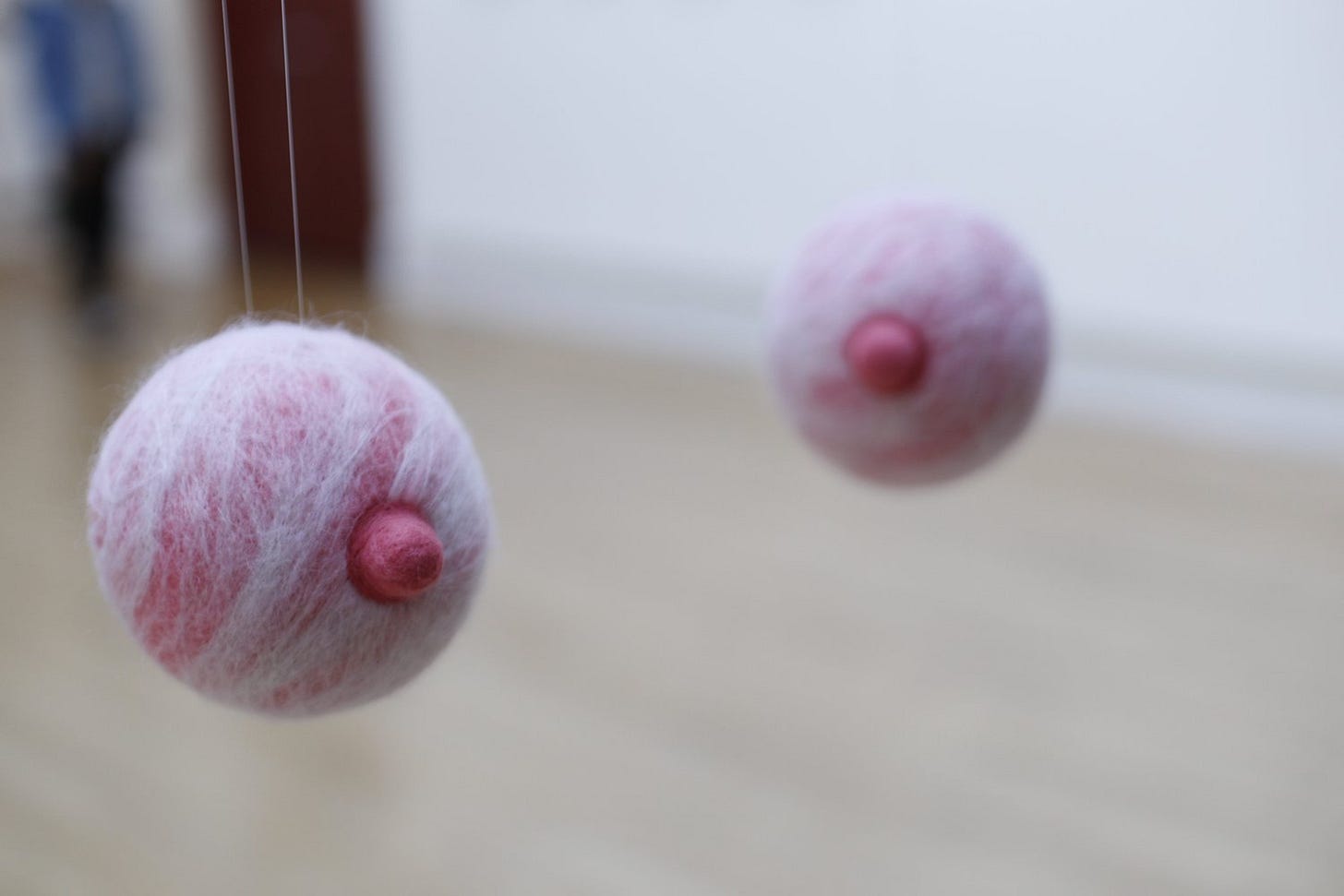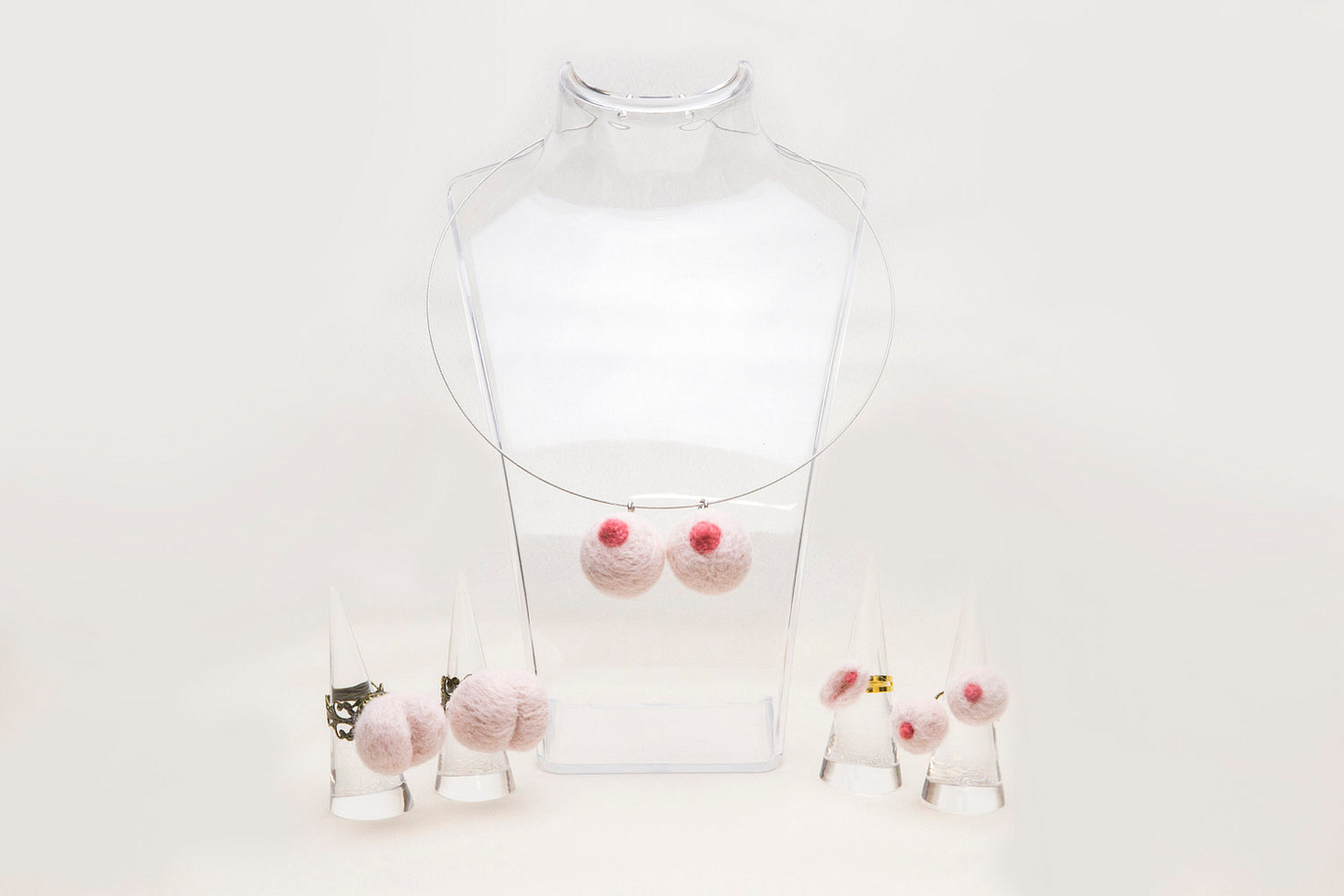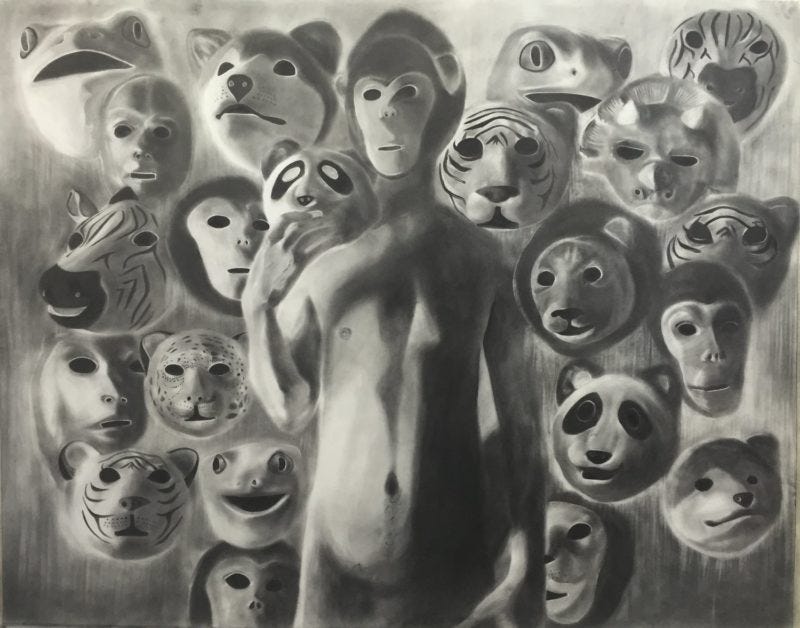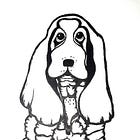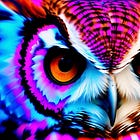Art+Psychology Interview with Chinese Feminist Artist Weijue Wang
"Although I didn’t feel the pain, I could still feel the movement of the surgery knife and the needle penetrating my skin. I felt like I became the needle-felted toys that I used to make."
This interview was originally published in 2016 by Fempotential. It has not been updated before re-publication and we should not presume that the artist feels the exact same way about everything today. Humans change and grow. Regardless, the words and work are powerful.
Artist Weijue Wang is an emerging Chinese feminist artist, born an only female child to a family in China and now living in San Francisco. She is navigating different identities, bringing her personal experience into her work but trying to approach difficult topics through humor and cuteness. She works in several mediums, incorporating needle felting as a result of her own personal experience with cosmetic surgery, a practice her work regularly comments upon.
Kathryn Vercillo: What are your earliest memories of becoming an artist?
Weijue Wang: Before I was born, my dad’s best friend bought a piano for me. It was quite a luxury object for us, so my parents pushed me to take piano lessons as soon as the teacher was able to take me. However, I didn’t enjoy playing piano, and I tried everything I could to not go to piano lessons. Eventually my parents discovered that every time I was not playing piano, I was doodling on paper. It was a relief for both my parents and me that at least I could learn some art without crying. That was how I started my journey to becoming an artist.
Kathryn Vercillo: What have been your biggest challenges as a young female artist?
Weijue Wang: Being a female only child in China is not an easy task. People expected me to be quiet and obedient. Since I have become a feminist artist who works in multi-media, sometimes I can’t fit into the social norms as my family wished.
Weijue’s artist statement shares:
“As an emerging Chinese female artist who lives in an age of consumerism in China, I am bombarded with the commodification of everything in every aspect of my daily life. I am interested especially in the commodification of the female bodies. Contemporary women are freer to think and act. With enhanced freedom, however, some threaten their self-esteem by seeking painful cosmetic surgeries to modify their appearances. In the name of beauty, some women commoditize their bodies to fit into the sexualized beauty norms. In my recent series of works, these soft and fluffy female private part jewelry pieces and sculptures are born in my needle’s sharp penetration through the felt. Underneath their harmless domesticity, I want to unveil the profound violence and irony in female commodification and mass-produced beauty.”
Kathryn Vercillo: You have experience in many mediums. How did needle felting come to be a key part of your work?
Weijue Wang: I was taught to be a painter, but I also enjoy experimenting with other mediums. The idea of using needle felting to create art pieces came from a special personal experience. When I was in middle school, I was very ashamed of my small eyes with a single eyelid, so I used cosmetic tape to create westernized double-eyelids. I used tape every single day, and I felt extremely insecure without wearing it. When I traveled to the U.S. for college, I realized that not everyone in the world is limited to only liking westernized double eyelids. I finally didn’t have to spend so much time adjusting my eyelids in the morning!
However, because I had been wearing tape daily for more than six years, the skin on my eyelids had become really loose. Without wearing the tape my eyes ended up getting infected because my eyelashes were so oppressed that they started sticking into my eyes. Therefore, I finally got an excuse to have real double-eyelids by doing cosmetic surgery last summer. It was so absurd that when I finally learned to embrace my appearance as it was, life pulled me right back to where I started to have the same old struggle.
During my surgery, I felt so vulnerable lying on the surgery bed. Although I didn’t feel the pain, I could still feel the movement of the surgery knife and the needle penetrating my skin. I felt like I became the needle-felted toys that I used to make. I was lying on a sponge, waiting for the violence, and ready to be modified. As soon as I recovered from the surgery, I started using needle felting as a way to express my thoughts about societal gender / beauty norms.
Kathryn Vercillo: Your work comments upon plastic surgery; what would you like to say about the practice?
Weijue Wang: Popular media and pornography have brainwashed many women. They feel like they have to have certain looks and behave in certain ways in order to be loved. It makes some of them not satisfied with the look of their eyes, noses, chins, boobs, and even vaginas. Especially in East Asia these days, having a cosmetic surgery done is as easy as buying a new jewelry piece. People can change their appearances very easily at a very low expense. Although women nowadays can have more control of their lives, some of us still subjectively choose to objectify ourselves. It is a struggle.
Kathryn Vercillo: How has your cultural background / identity influenced your work?
Weijue Wang: Sometimes I really struggle with my identities a lot in my art. As a Chinese woman who spent most of my life in China but then did so much of my studying in the United States, I began to have a western mindset when I am dealing with my subject matters that came from my life experiences living in China. I feel like I am living in an ambiguous space that I don’t know how to deal with. I don’t belong to the U.S., but I also can’t fit into the Asian societies.
Kathryn Vercillo: What influence has living in San Francisco had?
Weijue Wang: San Francisco definitely helps me in developing my works and thoughts about many issues that I am dealing with in my art, especially with its LGBTQ culture and social inclusiveness.
Kathryn Vercillo: What advice can you offer to someone who is considering whether or not to go to art school?
Weijue Wang: Going to an art school doesn’t mean that you can skip lectures and heavy readings. You will have to read a lot more than you can ever imagine. It is a big commitment, and you will become a new person when you graduate. I came to SFAI as a committed painter who painted realistic figurative oil paintings, but now it’s all changed.
Kathryn Vercillo: What do you most hope to express through your art?
Weijue Wang: There are too many serious articles talking about social norms, so I just want to use a funny and cute way to express my personal thoughts on the topics about gender and beauty. Most viewers find the humor in my work but also see that it implies some serious problems. Female viewers tend to understand the violent part of the work more than male viewers.
Kathryn Vercillo: And how has your family responded?
Weijue Wang: Yeah … Exactly as what you are imagining … this is one of my biggest struggles.
If you have read this far, remember that writing takes much longer than reading. Support the work by paying for it. My Sliding Scale annual rate starts at $10.




